#schelling points
Explore tagged Tumblr posts
Text
No, you're misunderstanding Schelling points; total absence of coordination is a degenerate case that proves the concept, not an inherent trait of Schelling's 'focal points'. Many of his examples deal with advance coordination, followed by a break in communications such that no further coordination is possible (or sometimes, that none is necessary).
National borders are Schelling points; they're one of the original examples in Schelling's book and one of the ones he's particularly interested in. They're usually established by action between several parties, but having had that established, they become Schelling points and persist even long after the original reasons for creating that agreement fade.
Example of the same phenomenon at work: The Ottoman agreement on shipping through the Bosporus, the Montreux Convention. Turkey is holding to that convention strictly enough that they're engaging in a large canal-building project to have a channel for large ships they have full control over. Why? Because it's a Schelling point, and it's better to stick to it than to reevaluate everything else that relies on the same structure of implicit coordination; if you break from this Schelling point, you will be assumed to break from all the others like respecting national borders.
Craigslist and Facebook are Schelling points. Both of them have successors which are significantly superior, but the fact that they are the most popular by large margins means that in the absence of a large, sudden coordinated move to one of the successors, they remain the focal point where everyone coordinates in the absence of communication.
And, yes, Bitcoin is a Schelling point. There's no real reason that all the trading volume should be in Bitcoin rather than Dogecoin. Dogecoin has been around twelve years now and doesn't have a supply cap. But Bitcoin was first, and so standardizing on any other coin would require coordination, and it's easier to go with the default focal point that's already established.
In general, the status quo is a Schelling point, in full generality. Leaving things as they are requires no coordination, and in most cases that's what will happen, as everyone remains at the focal point, lacking sufficient reason to communicate and coordinate to do anything else.
The idea of a Schelling point (or focal point) is that it's something two people can arrive at without prior coordination.
It really drives me nuts when people call something a Schelling point and just completely forget about the "without prior coordination" aspect. Like, if I go to New York and a guy calls me and says "hey, let's meet at Grand Central Station at noon", that's definitely different from us selecting Grand Central Station in the absence of talking to each other.
The "without prior communication" thing is what's interesting about a Schelling point. It's what makes it a Schelling point.
And yes, this is about Nate Silver's On the Edge again, I'm sorry.
Bitcoin is not an example of a Schelling point, and it's absurd to me that you could write a book that's at least partly about game theory and claim that it is. There is quite a lot of communication happening with regards to "what's popular", there are people whose entire job revolves around screaming to the rooftops about how awesome particular cryptocurrencies or artworks are. This is entirely explained by network effects, first-mover advantage, and active communication.
He also makes the argument that art prices are an example of Schelling points, and no, that's not true, they're the result of a lot of complex social and market dynamics that involve huge amounts of explicit communication and coordination.
#corrections#schelling points#thomas schelling#consider reading The Strategy of Conflict yourself#it's very interesting
58 notes
·
View notes
Text






























The USA created Nevada Territory out of the Nebraska and Utah territories on March 2, 1861.
#Grimes Point Archaeological Area#Nevada Territory#2 March 1861#anniversary#US history#Reno#USA#Carson City#Wendover#cityscape#landscape#summer 2019#2017#architecture#Nevada State Capitol#Sand Mountain Recreation Area#Schell Creek Range#Comins Lake#Schellbourne Rest Area#street scene#truck#Nevada#original photography#travel#vacation#tourist attraction#Spring Valley#Tonopah
4 notes
·
View notes
Text
for some reason, the columbus day question is in a lot of recent media from italian-american college profs and now i've been exposed to the worst take on the matter: change it to fiorello laguardia day
#'why do we pick the earliest cultural figure possible?' it's simple: it provides a schelling point which allows each group to claim victory#without turning the actual selection into an intra-factional squabble
2 notes
·
View notes
Text

okay okay i'll go to l*ssonline next year.
#it's not as if i've any need of practice#but consider:#pixie schelling point#i have zero interest in ai conversations#yet should i not dare that peril too in chasing wings of gossamer?
1 note
·
View note
Text
It is indeed true that we have differing assumptions; but that is an accusation that cuts both ways. To continue your example, the Muslim will indeed find the Bible unconvincing, but if he points to the Koran as a counterargument he's making the same mistake. (For the record, I am not any sort of Christian but I do believe in an objective morality and that some parts of it are deontological, not utilitarian. How I justify objective morality in a materialist world is possibly the only subject of Discourse that leads me to make even longer posts than libertarianism, so I hope you'll agree to avoid that and stick to one subject; I'm just telling you where I'm coming from.)
So, in that case there are two ways to proceed: One, we can fight, and may the most violent party win - which seems like it ought to have led to the permanent victory of property rights, by your account, since all these wealthy and powerful people are served thereby. Or we can try to argue for our fundamental assumptions, to justify the apparent axioms by appeal to still more fundamental ideas until we find some bedrock we agree on. (Or give up and appeal to violence.)
I agree that the details of how we think about property were hammered out over millennia, and could be changed without doing harm; one example I often use in discussions with other libertarians is that in Norway, the bundle of rights that we call "land ownership" does not include the right of excluding others from peaceful passage over lands you're not currently raising crops in. (You can Google "Allemannsretten" if you're not already familiar with it.) This obviously differs from the American conception of property which indeed does allow you to hunt people with a shotgun if they step onto any of your land without permission, yet it has not led to the collapse of Norway as a society. (Or, not yet anyway. They sure are pretty socialist; we'll see how it goes.) And it's true that there's such a thing as a de-minimis trespass, a harm so small that fixing it with violence, even though you'd have the right to do so, would be worse than just ignoring it.
But neither of those things matters to importance of the core concept of property itself, which is not, actually, a social construction. (And if it were, that wouldn't be a knockdown argument either; many socially constructed things are Really Quite Important.) Literal chimpanzees have a concept of my goddam banana, about which they'll get Really Quite Violent if you violate it. This suggests to me that property (core concept, not details) is at any rate embedded in our biology, if not in the laws of physics. Along with the rest of morality, to be sure; where else is it going to come from?
And having admitted that the concept exists, I do not see a way to defend it (and even you admit that we need some sort of property) short of making it absolute. Again I ask: Having allowed a small violation, where can you stop? In Jewish theology (to bring in a third guy to argue with the Christian and Muslim!) there is the concept of a "wall around the Torah": Having agreed to not violate God's law, you then put a fence not around the law, but around the grey zones where you're maybe and maybe not safe; and then another fence still further out, to be absolutely certain you didn't break the law by accident. Defending property looks similar to me: Even if you thought there was some amount of coercion that was morally acceptable, you'd practice zero tolerance as a merely practical method to ensure that you didn't cross the line by accident.
I would like to note that I'm not talking airy theory, here: Every state has travelled down this path. In Anglosphere history, it begins with the King as first among equals, who can call up his friends and their friends if defense against invaders is needed but is supposed to "live off his own", that is, keep an army based only on the rent of the lands he personally owns. It continues through asking his friends to make a monetary contribution instead of sending soldiers, then - and this is the crucial mistake - voting to have *everyone* contribute money, even the ones who voted against the representatives or the proposal. And from there it's all downhill and you end up spending literally half of what society produces on whatever the government decides to spend it on. I'm not exaggerating, have a look at the ratio of government spending to GDP in e.g. Germany. Is "literally half of everything you make" an acceptable amount of coercion, to you? If not, how do you plan to stop short of that, if you don't hold the line at zero? The US does better than 50% but it's still above a third, and the ratchet just keeps turning.
“Leftists want to enslave doctors” is such a weird take to keep showing up. I think it’s a libertarian thing?
243 notes
·
View notes
Text
I thought this was a well-framed piece on changing tastes in US literature - there absolutely has been a marked shift in what kinds of books are widely read over the past ~50 years. It also slots into some of my own themes around "what happened to all the capital-g Great People" discourse - will there be a new crop of "American Authors" a la Hemingway, Updike, etc, or is that passé, and if so why? Yingling (correctly imo) pushes back on the "death of literary fiction" as being something created wholesale by the internet and trends like declining attention spans - the death happened well before the internet took over everything (it was firmly established by the 2000's), and people do in fact read long books, just as much as they used to (most people never read hefty literature in any era).
Yingling instead posits that this shift is also not due to a change in reader taste, but instead more in "supply" - the death of easy revenue streams for literary authors, changes in how publishers operate, the chasing of awards and genre niches over general readers. To simplify, he believes that one could be an Updike of Our Era, if only one of sufficient talent truly tried and the gatekeepers pivoted to encouraging that. There is truth to the supply issues, but here I think he is overreaching - the supply is instead reflecting the changing demand.
This error is most exemplified in one of his arguments around why it hasn't changed, namely that people still read old literary fiction:
For one, people still read plenty of literary fiction, what they don’t read is contemporary literary fiction. Books like Pride and Prejudice, War and Peace, The Brothers Karamazov, etc still sell many thousands of copies every year, more than even big hits in contemporary literary fiction.5 And look at any survey of contemporary audiences' favorite books. Plenty of literary fiction there.6 So I think there’s a strong enough warrant here that the ‘taste-change’ hypothesis can’t be right either — unless the internet made people’s tastes magically shift away from contemporary literary fiction but not classics.
I don't specifically blame the internet, but I think this is revealing about the author's blindspots - people's tastes absolutely "magically shift" to classics over contemporary works! There is this thing, it is called status? Humans love it, they do so much because of it, and sometimes they even read books due to it! People are reading classic literature precisely because it is classic, it is "the canon". They are also Schelling Points to make reading social - you can easily form a book club around Wuthering Heights because everyone is "supposed" to read it; no one has to read whatever is #46 on the bestseller list today. That in fact drives a lot of media consumption more generally - people read the "hot new thing" and the classics so they can be a part of the wider conversation of society.
From this lens, from where the conversation is, I think you can see more shifts in the demand side that our author misses. He compares the best selling fiction of the 1960's, which was mainly literary fiction, to a sample from 2023:
It Ends with Us by Colleen Hoover It Starts with Us by Colleen Hoover Fourth Wing by Rebecca Yarros Atomic Habits by James Clear2 Dog Man: Twenty Thousand Fleas Under the Sea by Dav Pilkey
Which highlights that three of the five are romance novels (the others are a kid's book, which I don't think says anything, they don't "compete" with literary fiction; and a... nonfiction self-help book? So a typo by the list makers? Let's just ignore that). Now, for one, I would note that this being heavily female is saying a lot about how demand has changed, but that is a bit too obvious to belabor. Instead, I wanna interrogate that word "romance" - I don't think it means what the author wants it to. Let's look at It Ends With Us:
The story follows florist Lily Bloom, whose abusive relationship with neurosurgeon Ryle Kincaid is compounded when her high school boyfriend Atlas Corrigan re-enters her life. It explores themes of domestic violence and emotional abuse. Based on the relationship between her mother and father, Hoover described it as "the hardest book I've ever written".
I'm not saying this is Blood Meridian or anything, but this isn't Harlequin either - it is blending romance tropes with the introspective, the memoir, and some topical politics. At the same time that "literary fiction" has declined, other genres have "grown up" - they cover a lot more diverse ground, targeting demos more specifically and expanding their narrative and thematic scope.
There have been several literary cultural movements specifically playing with this kind of broadening - the decline of lit fic coincidenced with the "memoir boom" of the 90's & 2000's, where "ordinary people" wrote creative-fiction-esque retrospectives on their lives, which you can see covers a lot of similar ground. Hell, to tie it back into gender a bit, if I wanted a serious story about politics & war back in the day, pulp fantasy wasn't gonna do that for you - but it will today! The 2000's was an entire decade of fantasy novels "growing up" (ymmv on how well ofc), and you can get your discourses on the nature of fascism Star Wars™ flavored if that is your tea.
Yingling essentially rests his hat on the idea of the "general reader" being out there still, like literary fiction has deserted them. But I think at least in part, this is a story of evolution, not devolution; in the 1970's we didn't make enough non-general literature to make specialists of the masses. But we do now, they have learned what they like, and aren't particularly interested in coming back to generalist fare. With caveats ofc, there were always be the Hot New Thing and universal appeal, etc - but being sufficiently talented is not going to make that the standard again.
139 notes
·
View notes
Text
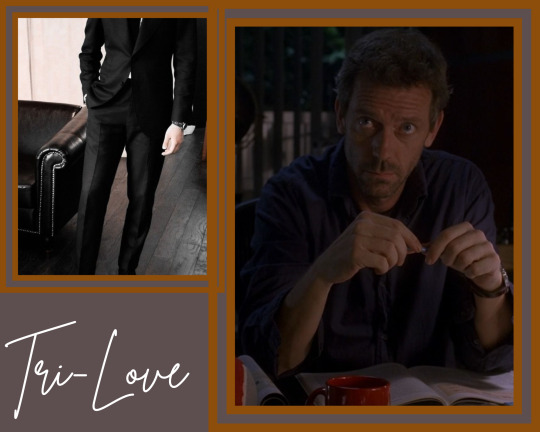
Title: Tri-Love
Requested: @crazyabout-writing
Plot: "You could write something about Dr. House, where he is in love with a doctor who is a pediatrician but their relationship is complicated, she is young and beautiful, but then a new doctor arrives. Tall, with black hair and always wearing a black suite, he falls in love with her and house gets jealous."
Warning: Jealous House
"You have three minutes..." Y/N says while holding her phone to keep track of the timer. "Go!"
The boy on the exam table grabs the pen provided before furiously drawing his best farm scene. Y/N had found that the boy's parents had to step out of the exam room so she took it upon herself to entertain him.
There is a knock on the door as Dr. House comes in. She looks at him with curiosity. "Whatever it is, it can wait three minutes." She points to the kid on the table, now drawing a lopsided cat.
Gregory House raises a brow. "Does that cat have four legs or--"
Before House's joke can make it out she quickly grabs his wrist and tugs him out of the exam room.
"You were not just going to make a joke like that in a children's exam room. Forget the exam room, this is pediatrics. What are you doing up here?"
House makes a dramatic gasp. "Me? Make an inappropriate joke?"
"Haha," Y/N says unenthusiastically. "What is it?"
"Lunch," he says with a snippy undertone. "You're late. And here I am finding why."
She groans. Of course she's late. When is she not? Before she could apologize, House brings more attention to them with an outburst just as the parents walk in. The situation was made even more embarrassing when Y/N phone alarm goes off. "Oh my Gosh! She's late to lunch because she's been cheating on me!"
"House," she grumbles under her breath before smiling at the child's parents and opening the door for them. Ignoring House, she looks to the child on the table. "Is that what I think it is?"
She shoots House a glare as she shuts the exam room door in his face.
*********************************************************
It really wasn't long that Y/N had been done with the child before another one came along.
"So, what's this I hear about a new doctor on the floor?" "It's you, House. You're the new doctor on the floor and you're not even supposed to be up here," Y/N sighs as she drops the patient folder at the nursing station.
"No," he says while tapping his cane on the floor. "I mean the fancy one. Dr....Shickle?"
"It's Schell"
"Like the sea shell?"
She ignores him as she picks up another folder. "It's pretty busy up here, ya know? Why not bother Wilson? You know, the head of oncology that doesn't seem to actually have any work to do.”
A snort leaves House’s mouth but Y/N can finally see through him.
“There’s a new doctor on this floor,” he merely says.
As he speaks, said new doctor arrives. Dr. Schell is wearing a black suit under his white coat which he takes off and folds over his arm. He looks at Y/N with a smile. “Need company for lunch, Y/N?”
The new doctor’s voice is enough to make any woman’s knees weak. Smooth and deep. House knows this and his eyes shoot to Y/N before he steps in. “She has one. She thanks you though.” House tried to make himself look taller despite his cane. Y/N arches a brow. This should be interesting.
Dr. Schell smiles and House hates the dimple on his cheek. "Well, I'm sure she doesn't mind more company?" His eyes drop down to Y/N. "Our lunch is at the same time."
"Actually," House says while nearly knocking something off the counter with his cane which Y/N is sure was on purpose. "She does mind." With another half-hearted and surly purposeful swing, his cane hits the lollipop dish off the counter and causes Y/N to jump despite seeing it happen. Y/N bent down to pick up the candies when she felt a firm hand on her rear that caused heat to rise up the back of her neck. Dr. Schell noticed the blush on her cheeks and raised a brow when he saw what happened. "I'm sure that's not ok, Dr.?"
"House. Also known as this one's husband so no, she does not need your company."
Y/N mouth drops open in surprise at House's rebuttal and is even more surprised when House hooks her arm with his and leads her away.
#fanfiction writer#fanfic blog#fanfic writing#fanfiction#fanfic#creative writing#gregory house x reader#gregory house#greg house#house md#house md fanfiction
142 notes
·
View notes
Text
Rereading the early Guild Arc is incredible because it's Fukuzawa and Mori engaging in viciously nasty and personal threats to one another's closest loved ones and allies that wildly escalates beyond their implicitly agreed upon tension, which comes to a head because Dazai petulantly mischaracterizes Mori as pathologically mathematical (because he isn't over that Mori could do what he did to Dazai) and intentionally triggers the paranoia and obsessive compulsive betrayal sensitivity that he'd clocked in Mori at fifteen, causing Mori to irrationally lash out and release Q (and then self flagellate because the consequences of this were wildly amplified by the Guild's seizure of Q), by which point Dazai realizes he'd gone too far and now has to get Ango hit by a car about it.
And Francis is just like. There.
(He's also going through it, but because Louisa isn't in underground son protection jail like Ranpo or hashing out unresolved grief like Dazai and Mori, she's keeping Francis rational with decision trees and focused tasks within the realm of his control.)
This is why there's a chapter called "The Conflict of Strategies." The Strategy of Conflicts by Thomas Schelling is about coordination between mutually dependent parties in conflicts. Unlike zero-sum games (in which one person's gain is equivalent to another's loss), mutually dependent parties rely on each other and so can't draw blood without harming themselves in the process.
The Agency and the Port Mafia are both pillars maintaining Yokohama's tenuous stability; if one falls, the whole city could devolve into a warzone. Thus, their mutual dependence is part of the logical structure of any strategy and demands some kind of collaboration or mutual accommodation, even if only in the avoidance of mutual disaster.
Mori often uses a strategy of irrationality, i.e. he acts volatile and whimsically sociopathic, where he's actually very controlled and rational, which Dazai knows. But, as Dazai reveals to Mori's horror in Fifteen, Dazai also knows where Mori is vulnerable to emotional provocation. This is because Mori, like everyone else, isn't completely rational or completely irrational; it's not a one-dimensional scale. But, "everyone else" includes Dazai.
Dazai characterizes Mori as a math equation because he's still reeling from the betrayal he feels over Mori sacrificing Oda despite knowing how much Dazai loved Oda, and despite Mori knowing it would drive Dazai away from him— because he and Mori also love each other. Even though Dazai probably understands logically that Mori made the decision despite his love for Dazai (and not in the absence of it) because Mimic was an existential threat on Yokohama, Dazai cannot shake the irrational and emotional thought, "If you could do that to me, of all people, you really are as coldly logical as a math equation."
This is irrational because Dazai knows that's not true; he demonstrated in Fifteen that he knows that Mori is terrified of, more than anything else, chaos, and that the threat of chaos is enough to trigger Mori into decisions he does not want to make and otherwise would not make. That's what he was trying to do in Mori's office in the first chapter of Fifteen— goad Mori into killing him by invoking a fear response.
But, Dazai is hurt and so he treats Mori as coldly rational and approaches him with vicious disregard for Mori's betrayal sensitivity, loneliness, and fear by taking Kouyou and leveraging Kyouka to keep Kouyou from returning to Mori. Mori, having lost Kyouka and thus Kouyou's incentive for staying in the Port Mafia, was already afraid he'd lost Kouyou's loyalty and support— and she's one of the four people he depends on. He also depends on Dazai, and although he's aware he drove Dazai away, that still hurts him. Further, Dazai demonstrating that he can and will use what he knows about Mori against him is terrifying to Mori because Dazai is one of the very few people capable of emotionally manipulating Mori. Dazai has Mori's nerves pinched between his fingers while telling Atsushi it's just an electrical wire.
Anyway, then Q is seized, hundreds of Port Mafia members and affiliates are killed, and Mori is wracked with shame and the fear that he behaved like the old boss. That's why Hirotsu and Chuuya are so gentle with him, and why, despite their agreement that Kouyou would stay with Dazai until Dazai saved Kyouka, Dazai asks her to return to Mori. It's also why the Agency and Port Mafia call a truce to collaborate against the Guild, without blaming Mori for what happened. They forgive because the cost of fighting is, as just demonstrated, too high, but also, they recognize that the escalation was mutually cultivated.
It's also why, at the very end, Mori asks Kouyou why she stays when she could leave. He knows he doesn't have Kyouka anymore, and he's still grappling with his guilt for those entrusted to his care that were killed because of his lapse in rationality. But, Kouyou assures him that this is a version of the Port Mafia she wants to protect. Because, even as Mori was spiraling and releasing Q, Kouyou was realizing that, unlike what happened to her, Kyouka could leave and decide for herself where and with whom she feels safe and has purpose. She could do that because Mori and the Agency have helped to create spaces and community and stability where there wasn't before. He's helped create a world where Kyouka can be a flower born in darkness and yet still make the choice to bloom in the light without being rejected or burned by it.
(And also because Kyouka left, and Mori didn't go after her to force Kouyou to stay. Because he would never do that.)
She wants to nurture that world with him, and she trusts him. The conflict may have escalated, but as soon as the cost was felt by the city and their own people, the Port Mafia and Agency were able to mutually deescalate and collaborate to contain the chaos and defuse it before it spread.
Mori isn't the old boss, and the humanity and love in him is reflected in his stewardship of their city. His humanity and love also mean he's capable of being hurt and will sometimes act emotionally and irrationally. But, it's okay for him to not always be rational; that's why Kouyou and Chuuya (and Hirotsu, who was goddamn MVP in the Guild Arc) are there to support him.
#bsd#bungou stray dogs#bsd mori#sorry ive been in the game theory sauce and Sarah and I reread the guild arc last night#and UGH i love mori that's my wife#hirotsu is like quietly always looking out for mori chuuya and dazai#those are his beloved boys who love each other so much theyre stupid about it. but that's okay. that's what hirotsu is for#(this is what community and friendship and support networks are for. creating space for us to be human.)
82 notes
·
View notes
Text
alright I have a very janky and not completely confirmed compilation of what's happening on the discord and twitter right now!
The ieytd Twitter account made a post about how two zoraxis interns, named Zoe and Zavier, had hacked the account due to incompetent people in the agency leaving passwords around. We (as in the discord) then found that the website was hacked as well, holding articles that pointed towards mind control, and John juniper being alive. Zoe and Zavier then started to recruit zoraxis employees, and gave us an email to ask them any questions we wanted.
We then proceeded to find out a very, very important thing, John Juniper is bisexual. (Have fun with that information)Anyway, we asked questions, there weren't really many important answers lore wise but here are the ones that are: Ollie is their uncle, he has been missing for 2.75 years, or 1000 days as of April 2nd. The twins are trying desperately not to reveal too much, as they don't want to get fired, although Zoe did reveal that their hair color is brown, which she said to be classified information(which I'm assuming is from Ollie's side, as their mom's family is from Chile, so hell yeah for us who made him a brunette :D ) this was also the first use of Morse code that I found with them, although as I'm writing this they've only used it one other time.There wasnt much else said on the first, so I think thats all the important stuff.On the second, they opened emails back up, revealed that Zavier is a fanboy for Dr Zor, and we started asking things again. Zoe also released the article about Ollie being missing on the website.
Then they closed the email.
On the third, Zavier revealed that he had to take the email down, because of some reason I can't remember, stating it was his idea and they needed to shut it down now.
Then they tweeted a bunch of stuff about how Zoraxis was better than the agency, blah blah blah, but in Morse code they said "don't believe us" Vacation post revealed the two were in Chile, making our "Zavier and Zoe are both agents" theory even more plausible, as the agency has a base in Chile, and there was an agency watermark on the image
Current theory is that "Zoe and Zavier are agents from the EOD, infiltrating zoraxis to try and find Ollie, who may or may not be their handler"A Schell Games person confirmed this to be relatively accurate, and that we have at least 50 percent of it right
Personally, I think that Ollie is still their uncle, I also think he was mind controlledButttttt that's not confirmed nor denied so I have ✨no idea✨Also the emails aren't actually necessary information according to the Schell person, just additional things so take those as you wish idfk
There's still more to come, I'll attempt to keep you updated
@stellar-collective and @wyvchard here ya go :)
#ieytd#i expect you to die#saving this#ieytd 3#ieytd 2#ieytd 4#Probably#We think the announcement for ieytd 4 might be on the 29th
50 notes
·
View notes
Text
Rewatching into the spider-verse and it's good, you know, but how come the confrontation at Aunt May's was presented as Miles leading them back to the house. How is that not the first place you check? It was the schelling point for the interdimensional Spider-People because she was his aunt, how are you not immediately spying on her as soon as you know you're dealing with a pack of interdimensional spider jerks?
23 notes
·
View notes
Text
hmm call me an Erik apologist all you want, but after thinking it well, i think the complaints people have about "sexy phantoms" and how "adaptations never adapt POTO well, they romanticize the story too much, it's a horror story not a romance" are kinda...unfounded?
Yeah you can make a potential argument about adaptations missing the mark, removing the deformity from Erik (which shapes Erik's whole character), and that...But also...how much is this true, and how much this has been exaggerated by really one or modern interpretations?
And i wonder...is it really? Phantom has had such a number of different adaptations all over the years, from different creative minds, and each of them presented a different view on Erik. Do most of them not adapt the book? Yes (as in no birth deformity, no Daroga, no scorpion or grasshopper, etc etc). Do they really change the main themes and mood presented in the novel, turning it more erotic? Are really all adaptations with a "sexy Erik and cucked Raoul!", as critics state? Heem, let's take a look.
We'll mostly analyze the big film adaptations, since Phantom has been told over and over again in different books, comics, videogames, tv shows, and it would take us A LOT to go through every one (also let's be realistic...we have to analyze the most "well known" Phantom adaptations so to see if the critics' words hold some water. I don't think it would make much sense to point out a Phantom adaptation that has these elements but like...only four people know of it lol)
Lon Chaney...Nope. Erik was still deformed, and the few sympathetic traits he has were erased to give him a boring clichéd "kill the monster" ending, going against what the book stated, where Erik dies of a broken heart and not lynched (curiously, how the same people that go "we must portray the book accurately, not show him sympathetically" don't mind this change, huh)
Claude Rains...Nope. Still ugly, dies by the end. No sexuality. Even the "love triangle" element is changed so that it focuses on Christine and her being annoyed by the two Raouls.
Herbert Lom...Still ugly and dies. This adaptation even cuts his attraction to Christine yet keeps his obsession with music, even cuts down his biggest crimes to lay it on the hands of his sidekick (imo this is probably the most "sympathetic" Phantom, imo, since he's interpreted as an artist who had his art stolen, only wanting to "get back" at the thieves; but nobody talks of him when discussing sympathetic Phantoms)
Phantom of the Paradise...Still ugly, loses, but like Herbert Lom, redeems himself through death.
Maximillian Schell...Ugly, dies by the end.
Cartoon - Ugly, dies, Christine doesn't go with him. This is the most book accurate novel but in another angle, haha (Daroga is here, death's head, abusive mother...not exactly what the smart ass critics want ;)).
Robert Englund...Ugly, loses, doesn't get Christine...In fact I'd claim this is probably the most villainous version of Erik, turning him into more of a Freddy Krueger clone than the complicated character Erik truly is. Really amps up the horror for all those "IT'S A HORROR STORY" smart-ass critics if they're so desperate for an "accurate" version (Erik didn't flay people in the novel, iirc, so, so much for "being accurate to the novel"!)
ALW-verse / the musical / Gerard Butler film / Love Never Dies / Phantom of Manhattan (i'm placing all of this in the same venue because basically, it's really the same universe / canon, ergo we're really talking about the same intrepretation / the same creator). Ugliness is there, but sorta downplayed...This verse often ends with Erik and Christine getting together...yup, this is the one version where the criticism is legit.
Charles Dance / Yeston Kopit musical / Takarazuka (again, same universe, same creator, same interpretation). Possibly the nicest Erik yet, but he's still deformed, and he still doesn't get Christine. He's sympathetic, a little romantic, but I don't think it's on the same league as the sexuality present in Point of no Return's lyrics or Gerard Butler's open puffy shirts.
Susan Kay's novel - This one is interesting because it takes a lot from the musical (i'd argue even more from that than the novel), and then influenced the musical and future iterations of it (this novel amps up the sexy angle A LOT), so I'm not sure to categorize it as its own thing or added to the musical verse. But, still...it follows the plot points from ALW (and elements we see in future installments of ALW's POTO, like the secret child, first appeared in Kay, i think, based on publication dates), yet Erik is still hideous, but his sexuality is present in the novel...as well as his murderous tendencies. This is the one version that combines elements of both horror and sex, imo.
Dario Argento - for fuck's sakes, nobody likes this version, lol, and even the normies don't know of it. BUT ANYWAY, IF WE'RE GONNA MAKE THE COMPARISON....Not deformed, "gets Christine", in a way, but woof this version also amps up the horror and has the most unlikable Erik of them all imo.
And everything else...Do people really care or know about those versions? Wishbone's or the other musicals, or the ass long number of books? Not really...
So really...the number of Phantom adaptations that have a "sexy, romantic" Erik can be chalked up to 2-3...against all the other adaptations that keep the horror elements or have Erik still looking horrible. And the great majority of them keep it in canon with the original ending- ea Erik dies and Christine goes with Raoul (it's really only Kay's novel and LND that have the "sexy Erik cucks Raoul" interpretation...and LND has always always always been mocked and rejected by the fans)
So it's people really throwing a tantrum over the ALW version being popular, really. (And i'm really curious how they don't mind when Erik is turned more villainous, like in Lon Chaney or Robert Englund's version, even though those are also inaccurate to the novel. (Erik wasn't a sexy doomed hero, no, but he also wasn't this Freddy Krueger bastard.) Funny that).
#poto#phantom of the opera#poto meta#gaston leroux#erik the phantom#erik poto#erik phantom of the opera#erik doesn't work with a one dimensional adaptation- he has to be both wonderful and terrible and heartbreaking#the reason i don't want a phantom adaptaton nowadays is because before you could get away with a simple portrayal#nowadays with righteous cynical buzfeed internet culture a bad interpretation will leads to years long shallow analysis and fandom witch hu#witch hunts- without people ever reading the book but considering themselves 'experts' by analyzing pop psychology into the musical bleh#mine#unless you have a psych degree or criminal psychology don't armchair diagnose fictional characters mmmkay?
32 notes
·
View notes
Text
I'm tired. Call this a rant or a vent post, but I'm so tired.
I'm not going to call anyone in specific out, but please for the love of god if you hate a character, STOP putting hate in their character tag. More specifically, if you hate people for how they choose to like a character, please, block and move on.
Yes there is a disproportionate amount of fan content for John Juniper, no it's not just basic white boy syndrome, he was the only one with a character model that showed up for more than five seconds and had an actual appearance for literally years. Positive association is a thing. Yes, you can hate him, that's normal and to be expected, dare I say most John Juniper fans do. No, most of the fandom doesn't actually think he's coming back, it's a running joke/issue based on how Schell handled their own lore that was founded before IEYTD 3 when Schell was acting coy about his status only to rip the rug out from under us with an obituary out of nowhere. No, you don't have to like the fanfics or fanart of Phoenix or Handler with Juniper romantically, but if you don't like it please block, scroll, or- I don't know- take a screenshot and talk shit with your buddies in private or something. Complaining about how a small section of the fandom posts frequently rather than putting in the energy to post more of what you like wastes your time and hurts people who are, god forbid, having fun.
And, frankly, it's not even about Juniper at this point. It's so disheartening to CONSTANTLY see "hot take, I actually HATE the way you engage with this fandom. You should make more things that are closer to MY interests." You know how much it sucks to see people say you're liking your media the wrong way when you aren't doing anything harmful?
First, it was that I wasn't making Phoenix "right" because I made them more effeminate and had them use she/her pronouns in my personal fanfics and fanart. Then, it was that Juniper was so gay he'd NEVER like a woman, and that women were just innately revolting, so shipping him and my Phoenix was gross and wrong. Then, it was why are fem!phoenix's so popular, they're nonbinary, stop assigning them a gender when there were like five fem!phoenixes total. Then, FINALLY, people chilled out and were tolerant of the fem!phoenix and mellowed out a little, but now it's I don't like the way you write/present John Juniper. If I had a shot every time I saw "hot take, I HATE Juniper, I don't get why the fandom likes him." I'd be dead. It's not really a hot take, it's the one I see all the time, but rather than investing that energy into making something new this fandom would rather just take pot shots at the consistent creatives rather than make something themselves.
I feel like a lightning rod of hate, but I don't remember asking for it. And I know a good handful of other IEYTD creators feel similar. If you hate Juniper so much, block his tag. Block the creators. Something.
But it's not fair to the people who are passionate about this game to be used as the resident dunk-tank because you don't like their favorite character, or you don't like their writing, or whatever argument of the week you have. We're here to have fun at the end of the day, and I don't see how an ooc self indulgent fic is harmful enough to warrant the way some of the people in this fandom are treated.
#no fandom tags#if you follow me you know#I'm really sick with a flu or something rn so maybe this is a bit too emotional#but I'm just frustrated#it feels like nothing I make in this fandom is good enough#part of me is thinking of just leaving it and blocking all the tags because frankly it isn't fair how me and my friends are treated#a fandom should not be this upsetting to engage with *this* regularly#that's not even getting into how this fandom treats reader inserts which is a whole other thing#might delete later idk
29 notes
·
View notes
Note
What are you reading lately?
recently finished audiobooks:
the invention of nature: alexander von humboldt's new world by andrea wulf (5/5 stars, extremely based takes for an 1800s european on the immorality of slavery, rights for indigenous people in the americas, and the negative effects of colonization on the environment. basically THE blueprint for all naturalists after him. probably one of the most beloved scientists ever)
central asia: a new history from the imperial conquests to the present by adeeb khalid (5/5 stars, just a wonderfully researched and presented book. a [necessary] focus on the role of islam, nation-building, ethnicity, and communism in central asia)
when we cease to understand the world by benjamin labatut (4/5 stars, i will never get enough of the history of quantum theory)
the art of communicating by thich nhat hanh (3/5 stars, he writes the same book every book but i still like it every time)
a brief history of equality by thomas piketty (2/5 stars, some good history but essentially a "we must discuss these problems further" book with sometimes weird possible solutions to problems. overall one obviously good point: economic reparations are necessary in many, many places)
currently reading/listening/holding/sensually imbibing:
system of transcendental idealism by fwj schelling (pdf)
a short commentary on kant's critique of pure reason by ac erwing (book)
the case against the supreme court by erwin chemerinsky (audiobook)
next on the to-read list (not in order):
non-places: an introduction to supermodernity by marc auge (admittedly a shot in the dark for whether i like it or not)
immediacy or, the style of too late capitalism by anna kornbluh (zizek and so on podcast did an interview with her that i really liked)
views of nature by alexander von humboldt (hopelessly humboldtpilled)
essays on transcendental philosophy by salomon maimon (imo kant's greatest critic and also has a cool philosophy of difference)
96 notes
·
View notes
Text
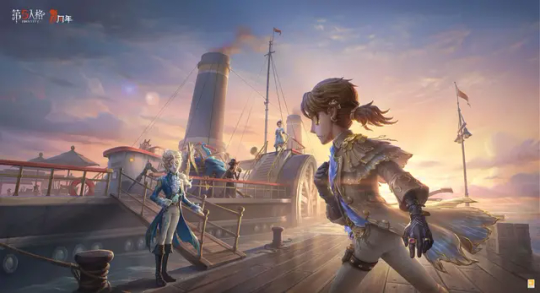
Truth & Inference - The Voyage of Oceanus, Noir, and The Proof of Azoth's Theorem
I got questions from @empireofvampires and @meyjhii involving Truth & Inference. Apologies it's taken me this long to get around to answering them! I posted some thoughts on the event when it first came out (the 1st were my "predictions", and the 2nd were my thoughts once we the 2nd trailer came out), but I'll work on the summary and any analyses that I can do for the Voyage of Oceanus, as well as my thoughts on Noir/White and whether he was experimented on, and a small summary and a couple of the major points of the Proof of Azoth's Theorem (sorry I didn't think there was enough to do much, but I can if someone's really desperate for it).
(I have not proofread this, sorry. I'll try to edit out any mistakes later.)
The Voyage of Oceanus - Summary
So we know Frederick's (Phantom Sail's) dad, Professor Schelling, was part of a research team on the research vessel "Isembard". Also on that voyage was Violetta's (Mercator Projection) dad, Professor Branley. Branley experimented with the mutated jellyfish's toxins on the rest of the vessel's passengers, causing hallucinations and eventually to the ship sinking. Professor Schelling as well as all his students died that day, 25 years before the present. Frederick was too young to inherit any of his father's knowledge or "academic achievements", but he discovers the truth of that voyage by the time he grew up. 25 years later, he recreates the voyage (with the help of DM) as closely as possible, even ensuring the passengers are similar to the original ones and play their assigned roles.
Mr. Inference is requested to solve the mystery of the Isembard by "Richard Worthington", the supposed last survivor of the sinking. Soon after, he is offered an identity (Theodore Banks) to allow Inference to partake in the voyage by an anonymous individual, who states their reason for doing so is because their "interests are aligned in this matter".
Professor Branley's daughter is also included in the voyage. She is to be the cartographer whose chart will retrace the route of the original Isembard. During the voyage, passengers start hallucinating due to poisoning from the jellyfish toxins. Inference discovers this as well as that the chart Violetta is using is incorrect, and that Frederick is the one behind everything. Frederick wanted to investigate the jellyfish at the "heart of Oceanus" and has been testing "refined" toxins (as part of a new drug) on the passengers. Even Inference was affected, who passed out after confronting Frederick about the truth, with Frederick also eventually finding out that he was Inference. Frederick later states that if Violetta charts them a route home and if the other passengers stay ignorant of the experiments, he won't do anything to them. Additionally, Frederick wants Inference to help "thwart a certain scheme" concocted by DM. To all this, Inference agrees, and after dropping off the other passengers, he then departs to fulfill the new request.
So, the few things that catch my eye is the anonymous individual who provided Inference his fake identity to board the Isembard, the drugs (made from "refined" jellyfish toxins) that Frederick is using to poison everyone, and whatever "scheme" of DM's that Frederick wants Inference to stop.
The Anonymous Individual
The anonymous individual is someone who was aware that Inference had gotten a request regarding the Isembard, and thus at least is someone who's heard of Inference's name and works as a detective. It's possible that whoever it is relates to wherever Inference is being sent next, and whatever this "scheme" is.
Initially, I wondered if the client that originally hired Inference to investigate the Isembard was Frederick and if the anonymous person was DM.
The former idea I now believe is incorrect as Frederick implies he wasn't originally aware: "Had I uncovered your identity, perhaps you truly would have met your end on the deck that day".
As for the latter, I'm not 100% certain it is based on how the person says: "I did conduct a little private investigation into you and your firm in advance, but considering how quickly our time is running out, please forgive me for forcing such a bold introduction". This makes it sound like someone who's not super familiar with Inference and his detective agency. Not to mention how the person talks about "our time is running out". That doesn't sound quite like DM, who I don't think is ever in any hurry to sound like that, unless he's acting since Inference has no idea who he's talking to. But still. At the moment, I'm leaning more towards this being someone we will be introduced to in the next event, when we get to find out where Inference was sent to.
However, an idea I’ll get more into later, I wonder if this person may be Gatto.
We already got a small reference to him in the Zinaida event (the doctor who gave the drug that helped Ada with the outbreak at the children’s hospital), so maybe we’ll finally be able to see him appear in an event. Gatto would be someone who isn’t super familiar with Mr. Inference, but we have seen him “[conducting] a little private investigation into you and your firm in advance” based on the article we see Gatto reading at the end of his comic. That and the cork board in front of Gatto’s desk at the end of his trailer that details many of the events tied to Mr. Inference and his detective agency.
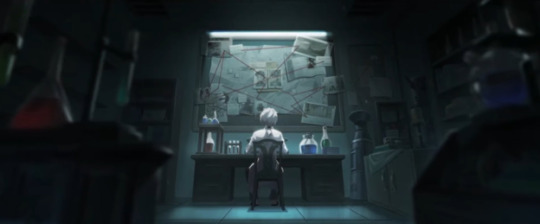
We even see him communicating with Inference in Gatto’s trailer based on the paper Inference is holding with the image of Gatto’s cat on it.
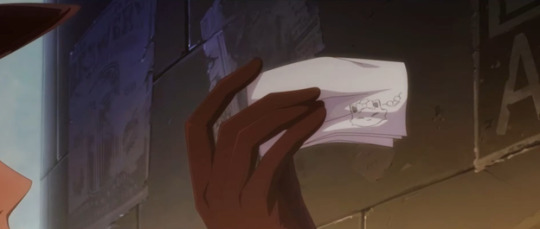
To go along with this, there is even a mention in the comic that would fit with the idea Gatto would sound like he’s in a hurry like the anonymous person sounds in their message to Inference. In the comic, he has a message from the Ulliel family stating they’ve prepared the lab and everything he needs to do the experiments now that he’s joined the Ulliel family. At the end of that message though, it states “Please do not forget about the agreement between us. Time has a limit”. If Gatto is facing a time limit, that’d explain why he sounds rushed and has little time to talk with Inference.
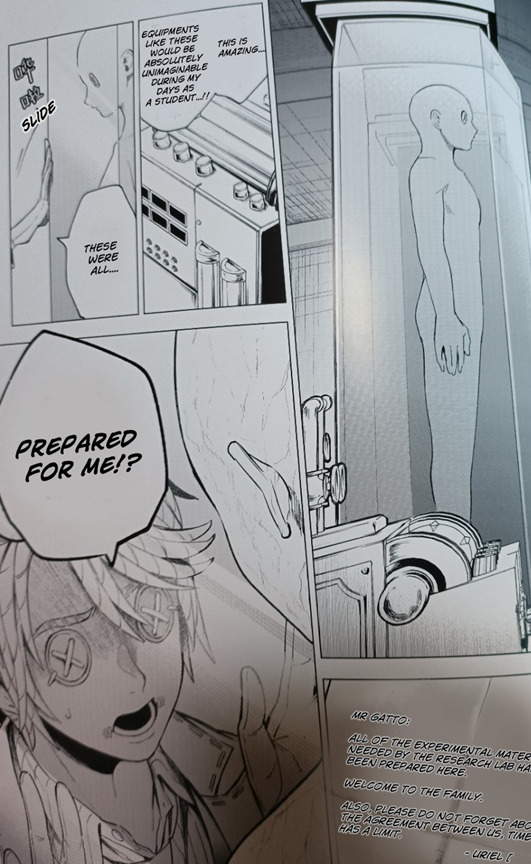
That and Gatto, due to his connection to the Ulliel family, would be familiar with DM (we even see them in the same place in Gatto’s comic and trailer).


DM is connected to Frederick, with DM being the one to fund the whole recreation of the Isembard and the voyage itself. Therefore, that means there’s a chance Gatto would have heard about this upcoming voyage DM (and Frederick) have planned and he would have an interest in the matter due to the involvement of the drugs (and the anonymous individual implies they have a shared interest), which Gatto’s trailer and end of his comic imply he wants to stop (or at least investigate).


But I’ll get more into this idea a little later when we discuss the “scheme” Frederick wants Inference to stop.
Frederick's Drug
Regarding the drugs, it's possible it may be connected to 1 of the drugs we're already aware of. This includes "Eternal Beauty" and "Delphi".
Delphi was a product of 1 of the failures of the Eternal Beauty experiments. It is a hallucinogenic that smells like datura and can cause death in large quantities (it is corrosive).
Eternal Beauty is a drug we know Ulliel (and Gatto) was attempting to create, and the successful version of the Delphi drug DM referenced. We know Eternal Beauty helped Ada (Else Goodwin) treat an outbreak at the children's hospital and had the side effect of causing drowsiness.
Both drugs were created using the same "ferns" (which based on implications regarding the doctor Ada got the drugs from, Ulliel is closely connected to these "ferns").
Hallucinations and drowsiness link these 2 drugs to the paint Tuberose used on Bélóstáin. That paint was made using the "special plant specimens" on that island, which are created by Rosemary via a "secret formula". Rosemary had created these plants to allow her to "[take] control of the island". We know DM eventually gained her trust, thus resulting in Rosemary sharing her formula with DM, who we know is invested in the above drug experiments.
Regarding the drug/toxins Frederick used on the Isembard, we know it causes hallucinations (which Inference first witnesses via Alice aka Candid Portrait), unconsciousness (Violetta aka Mercator Projection), and Frederick essentially implied it can cause death too based on his threats. Due to the similarities, it's possible his drug is Delphi or is an improved version of it.
The other difference I wondered about is Frederick seems to possess both “a poison derived from the toxins” of the jellyfish as well as a “highly effective antidote”. When Delphi was 1st introduced to us, we never learned about an “antidote” (likely since Zinaida had already died due to the drug, so there was no point), though it did say death is only caused via “large quantities”. This makes me think, if less of the drug was used on Zinaida, maybe she would’ve been like the passengers of the Isembard after they were poisoned. I wonder, if this is indeed a difference, maybe this could be part of Frederick’s goal for this voyage. To investigate the jellyfish at the heart of Oceanus, test out his poison, but to also test out his antidote? Unless he already developed the antidote and knew it work, but again it’s just a thought since I can’t help wondering.
DM's Scheme
There is little we can say about whatever scheme Frederick is asking Inference to stop, as unfortunately he gave no details. But I did want to bring up 1 idea based on the theory the "anonymous individual" is Gatto.
In the comic with his package, Gatto wants to complete his experiments to create a successful Eternal Beauty. The 1 subject that showed some success is stolen by Noir. Paranormal Detective tries to dissuade Gatto from continuing to work with the Ulliel family, saying they may be conducting unlawful/illegal experiments (and even calls the origins of the experimental products "suspicious"). Gatto says they only want to "help the living attain eternal youth", though he is beginning to have some doubts in the back of his head. Paranormal Detective then warns Gatto to be cautious of the Ulliel family and pay attention to their actions. Sometime later, we see Gatto mention the research will continue once the new experimental equipment arrive. Gatto is looking at an article on the detective Mr. Inference. After which, he puts on a gas mask and thinks to himself that, if he really is mistaken, he'll "need the detectives' assistance".
Therefore, I wonder if the "scheme" Frederick wants Inference to stop involves DM's drug experiments with the Ulliel family. Frederick said he'd take him to the "requisite location", which could be the Ulliel facility we see in Gatto's trailer and comic. At the end, he adds Inference can leave once the task is complete, at which point he says "the decision will be entirely yours if you choose to make these events known to the world or seek to apprehend their designer and pursue legal action". This implies the "scheme" is potentially illegal/unlawful enough where Inference will have the option to "pursue legal action" if he wants, which would fit the situation with the Ulliel family implied by Paranormal Detective.
It's possible this "scheme" and the anonymous individual are completely different from any of my guesses here, but this is just the only one that I was able to develop enough to guess what the "scheme" was. Otherwise, it'll just be someone new and a scheme we'll have to wait until the next T&I event to see.
------------------------------------------------------------------------------
Noir/White - Experiment?
Speaking of Eternal Beauty, someone had asked about the “001” marking on White/Noir’s collarbone and whether he was experimented on.
The “001” I believe lines up with the “M001” one 1 of the pages (the 1 labeled “Diagnostic Center”) from White’s package.



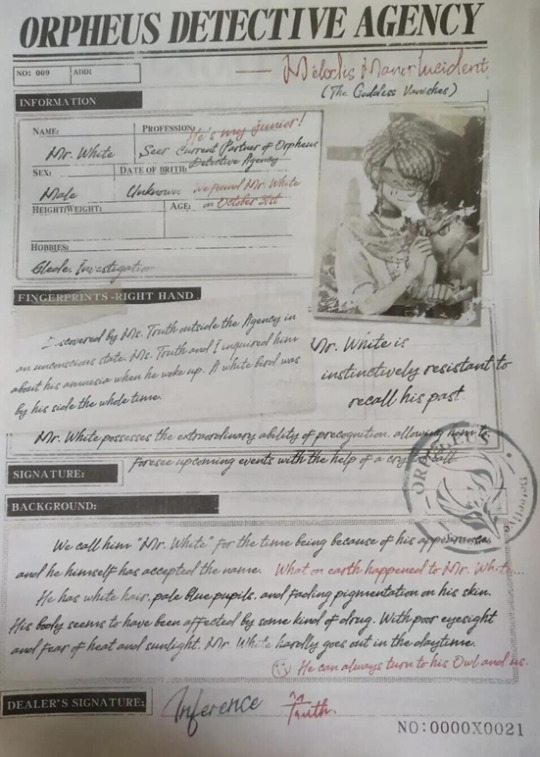
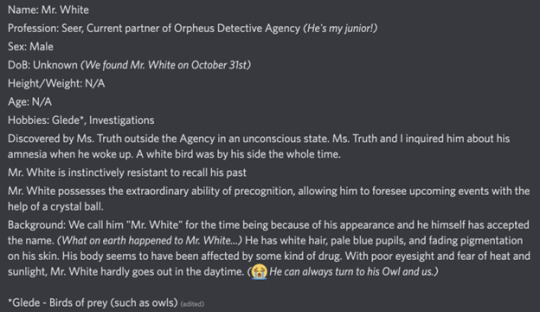
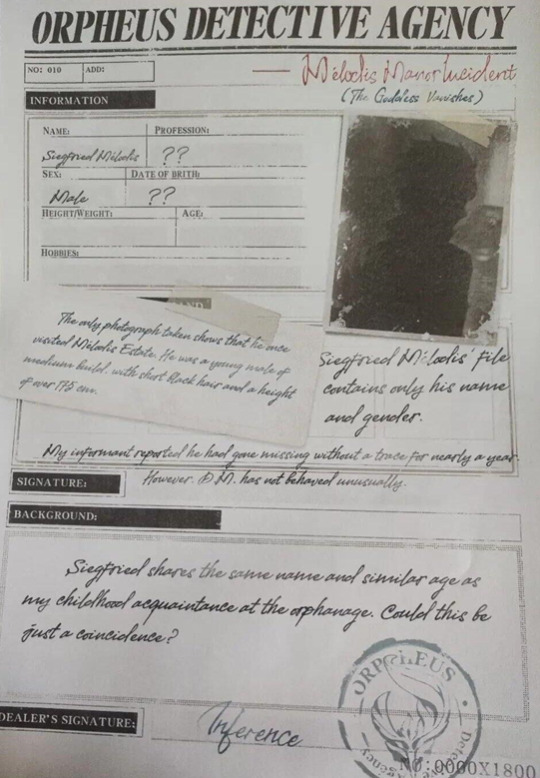
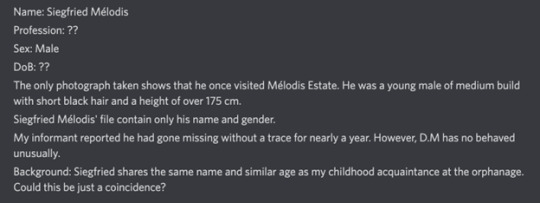
The file labeled “Diagnostic Center” mentions White’s “physical dysfunction and memory loss were probably caused by poisoning. This can match with how in White’s regular file (labeled Orpheus Detective Agency) Inference says “his body seems to have been affected by some kind of drug”.
White was found unconscious outside their detective agency with amnesia and “instinctively resistant” to recall his past.
The diagnostic file in comparison refers to him being in a “coma” and unable to recall any memories from before it.
In addition, White’s report describes him possessing a fear of heat and sunlight.
The diagnostic file does not make any mention to this, though it does state he was extremely thirsty and had a dry throat upon awakening. Besides that, it also lists him having headaches and “visual and auditory hallucinations”.
As for my thoughts, White was found “unconscious”/in a “coma” and experiences “hallucinations”, with his body affected by “some kind of drug” and his other symptoms caused by “poisoning”. This somewhat makes me think of the symptoms experienced by Violetta on the Isembard. Details are scant, but we know she was knocked out after being “poisoned” by Frederick’s drug made from “refined jellyfish toxins”. It doesn’t say she was in a “coma”, but it does say she had “entered a deep state of unconsciousness” and did not respond to noise while in this state. It also said her “breathing is weak”, which makes me think of White’s report mentioning hypopnea, which causes shallow breathing and reduced oxygen levels. She also only recovers once Frederick cures her, and it seems she might’ve stayed unconscious until that happened as it says later, once Frederick cures her, that was when she finally “[regained] her senses”. She doesn’t appear to have any loss of memory, though we don’t have all the details of the scene when she awakes. And even if she didn’t experience hallucinations, we know the other passengers who were poisoned did.
I do wonder if Frederick’s antidote is something new, and in which case if it’d help White at all? It’s possible it wouldn’t since Frederick’s poisoned is described to use “refined” toxins, and thus it might be different version than whatever was used on White, but still just a thought I had.
Continuing with my other thoughts, we know Noir stole some variant of Eternal Beauty. 1 that seemingly showed at least some success.
Based on Gatto’s comic, I wonder if the “experimental subjects” used for his Eternal Beauty experiments were derived from or used on the individuals from the missing persons cases referenced in Gatto’s trailer.

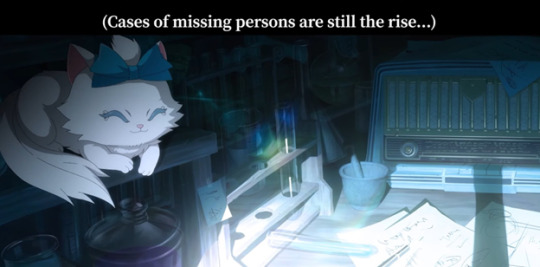
Later in that trailer, we see Gatto and Paranormal Detective looking shocked at some medical room with a number of bodies (likely dead) atop the tables there.
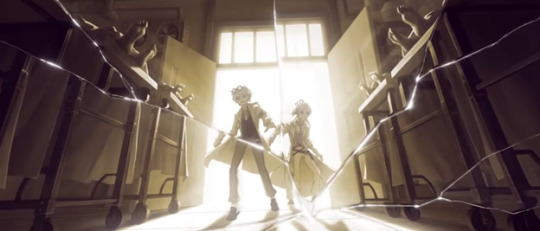
This is likely tied to why Gatto then says “All for that damn drug from that insane family”.
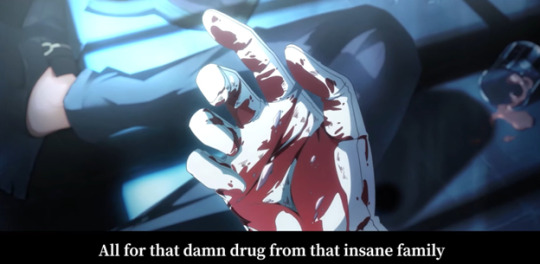
So Gatto and the Ulliel family were already using people as subjects for the Eternal Beauty experiments. It would follow then that DM, who’s shown tied to the Ulliel’s (and how he describes Delphi as a product of 1 of the failed experiments for Eternal Beauty, we can say he’s likely working with them to some degree), would also test sample he stole from the Ulliel’s on a person too. Noir is the 1 who took the drug, so I could see (with what we know of DM) that he’d test it out on Noir.
A thought I had in combination with this, we see in Gatto’s comic that an explosion occurs after he mentions “[adding] the wrong solvent” while working on creating Eternal Beauty. However, it is only after this that 1 of his subjects seems to show some signs of success. What if, once DM got his hands on the sample Noir stole for him (and once he did any further experiments on his own without Ulliel’s involvement, if he did do more experiments or tried to recreate what he had stolen), when he tried to either recreate the drug or test it on Noir, maybe a similar explosion occurred, or a fire started. If that solvent Gatto added is necessary for a successful version of Eternal Beauty, and it is at all capable of causing an explosion depending on the amount and what it’s combined with, maybe this could relate to Noir’s fear of heat?
Either way, Noir/White’s symptoms sound a lot like Orpheus’ after the final game when he was in a coma for a time and woke up without memories. We also see Orpheus hallucinating while at the manor, so he matches up quite a bit with Noir/White.
You could also say Orpheus is also resistant to an extent to recall his (true) memories, regarding the Final Game (which likely causes him to lose Alice) and the tragedy (the death of the DeRoss couple and his involvement in it, as his real parents helped cause it). Orpheus is creating Hydra that can be used to “reconstruct” memories, meaning create new ones that may be close to reality but aren’t the truth (like the Oracle drug from the 2nd anniversary package). It’s possible he’s doing this because he doesn’t want to remember, based on Alice’s letter to Orpheus in the 2nd anniversary package where she says “Please don’t blame yourself for father and mother’s death” and later “I could feel your pain”, while the original backstory for Oletus manor mentions (after their deaths) him being “in a trance for a long time due to the powerful mental shock, and protected himself by closing himself off”.
And speaking of similarities with Orpheus, we know there was a fire at the manor when Orpheus was found in a coma after the final game. In the original backstory, it actually mentions “the cause of the fire was the explosion of the incinerator in the absence of supervision”, so now we have an explosion to connect to the 1 we saw happening to Gatto as he attempted to create Eternal Beauty, while also relates to how these games were happening as part of Orpheus’ own drug experiments and creation of Hydra.
The issue with both “Eternal Beauty” and Orpheus’ experiments is we still aren’t 100% sure of the truth. We know that Gatto says eternal beauty will allow “eternal youth”, but we are also aware that Gatto doesn’t know everything about the Ulliel family and the truth of their unlawful experiments, so we don’t know for sure if that’s all this drug is being created for, or if that’s what it’ll really do. I mean, we know Ulliel has been kidnapping people based on the “missing persons” cases and see their likely bodies in Gatto’s trailer, the same bodies that Gatto may be using in his comic, including the 1 that showed some signs of success.
If these are dead bodies, it does make me question if their purpose is just “eternal youth”.
It does remind me of another thing that has appeared in the main storyline with the manor games. Specifically, a line from Violetta’s 4th letter: “We will forget everything in the past and gain new life”. I forget if this has appeared elsewhere, but the idea that the participants will “forget” but “gain new life” seems to fit Orpheus, who has “forgotten” and has gained “new life” considering he’s not like how he used to be. I do wonder if it’s possible the same sort of thing might’ve happened to the other participants, that they “forgot” everything and thus had to start a “new life”.
The same sort of thing has happened now to Noir/White. He’s forgotten everything and we know he’s different from before, since we’ve seen how he acts as Noir based on his trailer and Gatto’s comic (compared to White’s comic).
This is still an incomplete thought, as this is what I’ve been able to come up with so far. No way to know for certain what’s right or not. These are just theories at the moment until we get answers.
------------------------------------------------------------------------------
The Proof of Azoth's Theorem - Important Points
I thought about whether to do something for The Proof of Azoth’s Theorem, but I felt there wasn’t much of note from that event that would be important for the main plot of the series.
Truth reunites with Clio (Arya Miller), who’s inheriting Azoth’s Library from her grandfather.
Helios is obsessed with making the Philosopher’s Stone, and kills the other directors, including his brother (Director Waning Crescent), as well as lures Arya to help with the creation of the stone. Eventually, Helios takes Arya captive, tries to use her blood to make the stone, but it fails. Officer Jose, who had come with Truth to the Library, swims across the “opposite bank” (because “some nuisance pulled up the drawbridge early”) to sneak to a window, break it, then shoot Helios before he can do anything else.
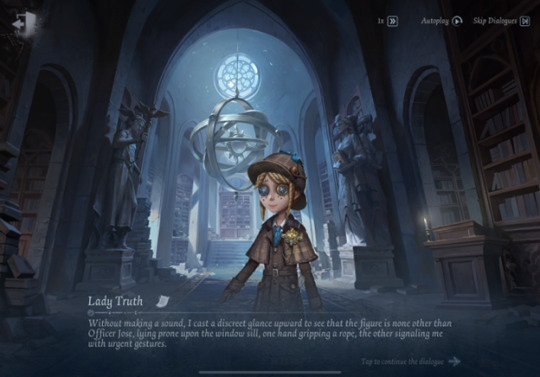




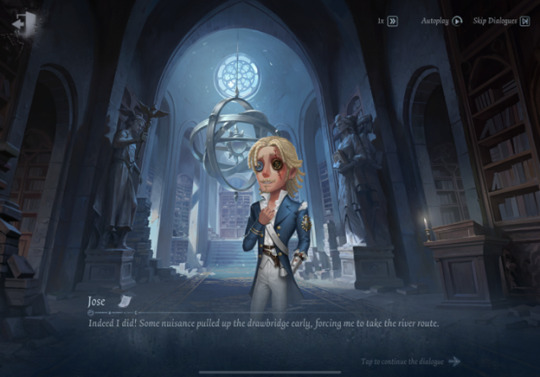
This was the one part I took note of, based on what Officer Jose says to Truth:
“Although I haven't exactly been active in the field for a long while, I haven't lost my touch! Back in the army, even Inference ranked below me!”

When Truth asks about Inference’s rank, Jose responds by saying: “Inference was third, I second...” in terms of rank.


This back-and-forth is the first time we’ve heard anything about Inference’s and Jose’s background. It’s not much, but it does tell us Inference’s position, his relation to Officer Jose, how the 2 met and likely got to know each other, and also the way it leaves open whoever was 1st in rank implies it’s likely something important to note. It could be DM, as we know he was in the military with Inference, or it could be someone else. I’d also like to add, as we know Ronald was also in the army with Inference, if Inference was 3rd and Jose 2nd, Ronald was likely at (if there was more than 1 at the third position) or below 3rd.
Jose’s “pinpoint precision” is another minor detail, and something I’d imagine is shared by the others from the military.
Otherwise, the only other bit from this event that may matter is it’s been 3 months since Inference left on the request regarding the Isembard, and we know he’s already accepted Frederick’s request. I’m unsure how long the Isembard’s voyage from start to finish took and thus how long since then Inference has been away, but noting the time is still good.
#idv#identity v#Truth & Inference#Truth and Inference#T&I#idv truth & inference#idv truth and inference#identity v truth and inference#identity v truth & inference#idv t&i#identity v t&i
33 notes
·
View notes
Text
As much as there absolutely is a rightward shift going on in the culture right now due to the election, I wouldn't overread on the spate of companies abandoning DEI initiatives - that is far less an example of that trend than it is a symptom. Those programs were always going to be disbanded in some way, because, well, they were pointless nonsense. The companies didn't adopt them out of organic organizational evolution; they were primarily adopted in 2020 in a fit of left-oriented revolutionary pique. By 2021 they were already cringe, their results were desultory, and their value-add minimal - primarily because their theory-of-change is just wrong, but also because companies were not actually ever going to change their hiring priorities the way universities did. But it was a little awkward to get rid of them in 2022, right? It would send a bad message, being the One Company getting rid of them. Some did, obviously, but still.
The election therefore is a textbook Schelling Point. A big event announcing to the world that the Old Left is out, the New Right is in just occurred; a perfect cover for a dozen companies to spontaneously-quasi-coordinate to do what they have wanted to do for years. It would have taken longer to happen if Harris has won, but it would have still happened; structural incentives do win out in the end.
60 notes
·
View notes
Text
Quotes from the book: One Glorious Hour, the Mike Hawthorn Story - to convince you to read it
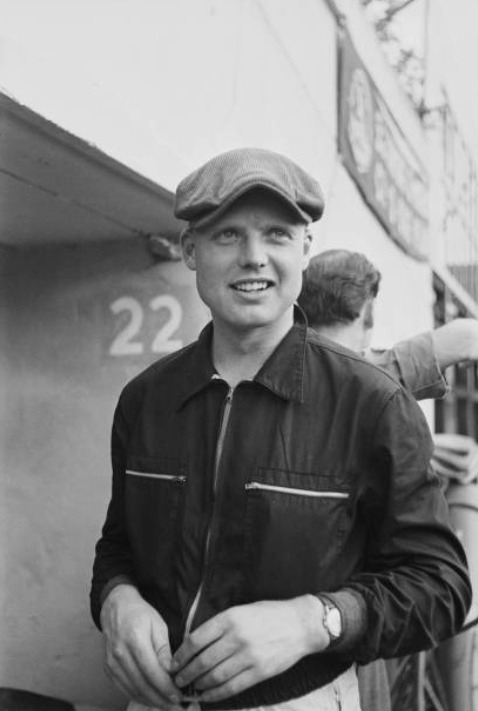
When Pete told him he was marrying Louise, Mike was highly peeved. "What do you have to go and do that for, you stupid clot?" he said. "Do you realise I'd have married you if you'd been a woman?" He then adopted Oliver Hardy's stoic look, with a slow deprecatory shake of the head, at which Pete became a mournful Stan Laurel. This prompted Mike to grab him by the throat and strangle him horribly, leaving Pete in a heap on the floor, gurgling and giggling
Stirling Moss, wearing a white helmet, grinned at Mike whose response was to give him a vulgar two-fingered gesture. Stirling grinned even more, gave him two fingers in return and pulled away.
Mike paused in the doorway as he caught sight of Stuart Lewis-Evans falling victim to a plastic jar of water perched over his bedroom door. It was followed by a huge belly laugh from Harry Schell, the perpetrator. And then Mike watched Stuart get his revenge on Harry with itching powder bought from Alf's Joke Shop back home in Luton. Mike felt he had to join in, despite the girl waiting in his room. It developed into the kind of alcohol fuelled rowdiness that always ends in something dramatic - and so it proved with Mike dumping a bucket of water over Stuart's head. It was only then that he went back to the bedroom to placate the girl. Stuart and Harry waited until Mike was in bed and then, suppressing their giggles, pulled a fire hose the length of the corridor, stopping outside Mike's bedroom. With a pass key 'borrowed' from hotel reception, they carefully unlocked the door and leapt in, aiming the hose and letting fly. The girl's screams and Mike's shout woke up Stirling in the next room, at which he sighed, turned over and tried to get back to sleep.
In the meantime Stuart had walked into the bar and joined Mike's gang. He did not know the verses, but could sing the refrain. When the song ended, Mike put an arm round his shoulder, then gripped him, drawing him in close. "Glad you could make it my little friend." From somewhere behind him he whipped out a hose pipe that was connected to the tap in the bar. "Regarding that bedwetting in Reims old mate, I'm returning the favour." With that he wound the hose pipe round Stuart's waist and stuck the nozzle down his trousers. Mike gave a signal to Duncan who had moved behind the bar near to the tap. Mike gave it a quick short burst. Stuart yelled out. Everybody laughed. The bar was in an uproar. "You've pissed yourself you dirty little man!" shouted Mike. "You bastards," said Stuart, clutching his groin. "That deserves a drink!" "Yeah, here's the second." Another quick burst, Stuart yelling. The gathering shaking with mirth. "Oh dear look at the state of you. Let me wash it off," Mike roared.
"You're being stupid Mike. We want to help. Duncan says..." "Pete" Mike suddenly became angry. "I know what I'm doing. And I'm not stupid!" He jabbed a finger towards Pete. "I want to win this thing! What's the point, there's only five races left! I've been through all this with the consultant and then I get Duncan, I get my mother and now there's you. Then there'll be Louise!" He threw up his arms. "For fuck's sake I'm just sick of it! I'm fine so just-why don't you all just leave me alone and do what you have to do instead of always..." He broke off because there was no point. Pete had gone.
"And what will that do Pete?" Louise looked at him in all innocence. "With any luck he'll blow up. His engine I mean." "But - why?" Pete stood up and gave her a hug. "Sweetie, if Stirling drops out...?" He ised her eyebrows at her leaving the rest implied. "Get it?" "Oh you mean that would give Mike a better chance?" "That's it. You are gorgeous. You know that?" He kissed her. She leaned back from the kiss. "But what if your engine blows up doing it?" "Tough." "Have you told Mike?" Pete hesitated and she knew he had. "Yes," he said. "He said he wanted to win In his own. Well, he would, wouldn't he?" "Did he say anything else?" "No He tried to strangle me." "That's good," Louise said with a smile. "That's the old Mike."
"So you see mate, I'm as pissed off as you are," said Pete. "What for?" "Because I beat you." "So what?" Mike was still Oliver Hardy, speaking slowly and pedantically, "Pete, I came second. I only lost one point from being the winner. I am now seven points clear of Stirling, so why should you be sorry? And you got eight points." "I know but..." "I moved up seven points, Stirling didn't win any points." "I know that but..." "Simple arithmetic. We both won! Now stop being a sentimental bugger Grrr!" Mike put both hands around Pete's throat and strangled him
Further adding to her pleasure was having seen Mike strangle the giggling Pete. He had not shown the slightest trace of jealousy or resentment towards him. Considering how much winning the world championship meant to him it spoke volumes about Mike's magnanimity. She recalled a remark that he had made to Pete, something that proved their friendship had real depth: "You're a bloody oaf. But if you'd been a woman I'd have married you."
Grimacing, he set off down the corridor and was met by Taffy on his way to bed. He stopped at the pain etched into Mike's face and expressed his concern. A descendant of a well-known aristocratic German family, he listened to Mike telling him that he had a gallstone problem. Taffy, understanding why Mike was anxious to keep it a secret, politely interrupted him to say that he would immediately telephone his cousin, a doctor who lived 20 miles from the circuit. The upshot was that Taffy drove a 40 mile return journey to return with a powerful brand of pain killing tablets and with the instruction that Mike took one that night but under no circumstances must he take any before the race. Mike was moved by Taffy's generosity. It was yet another debt with which he was landed. The patient had not liked 'Krauts' until now. Mike was one of the generation who had lived through the years of the Nazi domination of Europe and believed, as many did, that all Germans were responsible. He had now changed his mind and warmly embraced Taffy.
Louise was wide awake and dressed, sitting in front of the mirror and brushing her hair when he knocked at the door. "How's the Golden Boy?" she asked with a smile. "He's great mon ami "matess". How are you?" He gave her a kiss. "I'm terrific. Going to be a nice day. Sunshine all the way." He went to the bed and tapped the sleeping Pete on the shoulder. "Waker wakey matey!" "Bugger off," Pete murmured. Mike pulled back the sheet that covered his shoulders. "Out," he commanded. Another moan from Pete. Louise went to stand the other side of the bed from Mike. "One-two-three!" she ordered. Together they ripped back the bedclothes. "You rotters" Pete opened his eyes, crawled slowly out of bed and then wandered to collect his dressing gown from the back of a chair
Mike was there relaxing in an armchair when, just after 12.30pm, there came a shout from the staircase and soon afterwards Pete burst into the room holding the result of his labours, a completed wooden circle. Cackling, he held it up for all to see. There was a chorus of cheering from the assembled drivers. "Bloody genius," said Stirling, glancing up from an old copy of Reader's Digest. "Give the man a medal," said Harry. "Too right," said Pete. "Do you lot realise just how bloody difficult this is?" "A kid could do it," said Stuart, grinning. "What!" Pete looked offended. "I will give you my next one. I will bet you five pounds that you don't do it in two hours. Done?" "No," Stuart said. "I hate puzzles."
Amid the general laughter, Mike grinned, stood up and hugged him. "You're the winner," he said, then grabbed the puzzle and tossed it to Louise. "Eh! Don't you dare!" Pete levelled a threatening finger at Louise. She pretended to snap it open. "Don't-!" It helped pass the time.
He had tears in his eyes and his voice broke. "I miss him Louise, then suddenly, 'I'm sorry..." "No, don't be" Louise nodded, biting her lip. She came to him and raised her arms to embrace him. "What was it you said - "If you were a woman I'd have married you"?" "Yeah." "That would have been an interesting threesome?" Mike grinned. "Yeah, it would."
She ended with: "True love is true friendship. It can mean self sacrifice. Mike was the world motor racing champion but as a true, loving friend, one who would repay any debt, he was an even greater champion."
#a great book to read to learn about mike if you don't like non fiction#it really tugs at your heart#classic f1#f1#formula one#formula 1#vintage f1#mike hawthorn
14 notes
·
View notes